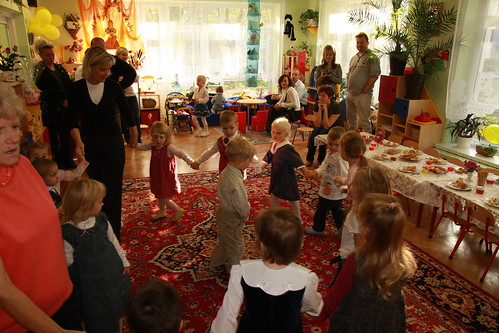Childcare in Poland – what to do with our beautiful bobas?! Posted by Kasia on Aug 4, 2013 in Uncategorized
All moms know how hard it is to go back to work and leave your precious little baby with someone else…
In Poland day nurseries have long waiting lists and you’ll need to act well in advance if you are going to find one that you like that also meets your practical needs.
The majority of Polish day nurseries will take babies from 3 months until 3 years old and they usually operate between 6am till 5pm. They all have to be registered by the local authority and inspected annually. Costs can range from 250 PLN to 600 PLN.
There are two different kinds of day nursery with different entry criteria:
Private nurseries. These are small businesses. Sometimes they are part of a chain of nurseries. For the expatriates we do recommend that type of day nurseries. Although these are significantly more expansive they are also much more flexible.
Community nurseries. You need to live in the area to qualify for a place, and many also have ‘social need’ criteria (You must have some recognised disadvantage, such as lone parenthood or low income). Community nurseries are subsidised, so the fees are generally much lower than private nurseries. Some local authorities buy or subsidise places at community nurseries and these places are often reserved for families in particular need. On the other hand, community nurseries also sell a proportion of places to working parents who can afford the full fees.
Baby sitters (in Polish “opiekunka”)
It is quite easy to find an experienced, competent and responsible nanny who not only meets your standards but also feels like the “right fit” for your family and loved ones. A lot of families have found that the usual childcare options, baby-sitting and childcare centers, do not meet their needs. For that reason try to find a baby sitter already recommended by somebody. Please ask your neighbors or coworkers for some recommended babysitters.
Przedszkole (Kindergarten)
Pre-primary education institutions form a part of the school education system. They organize care and education, thus complementing family education. They also play an important role in compensating environment-related disadvantages, this being achieved through various educational tasks which are designed to support the development of children and to help them prepare for school education.
Pre-primary education is provided for children between the age of 3 and the start of education in the first year of the 6-year primary school. It is organized in kindergartens, which are separate establishments, or in nursery divisions based at primary schools (the so-called “0 classes” – zerówka or klasa zerowa). 6-year-olds have the statutory right to receive one year of pre-primary education which prepares them to start primary school education.
Kindergartens are divided into public and non-public institutions. Public nursery schools are managed and financed by local authorities (gmina). A contribution towards the costs of nursery school maintenance is also provided by parents who pay for their children’s stay extending beyond 5 hours per day and for meals. The public kindergarten is statutorily required to offer children at least 5 hours of free teaching and educational activities per day.
Non-public nursery schools may be established and administered by legal and natural persons on the basis of an entry in a register held by the competent authorities (in Polish – kurator) – the head of local educational authorities, who is also responsible for pedagogical supervision. These institutions are financed by parents.
Do następnego razu… (Till next time…)

Build vocabulary, practice pronunciation, and more with Transparent Language Online. Available anytime, anywhere, on any device.
About the Author: Kasia
My name is Kasia Scontsas. I grew near Lublin, Poland and moved to Warsaw to study International Business. I have passion for languages: any languages! Currently I live in New Hampshire. I enjoy skiing, kayaking, biking and paddle boarding. My husband speaks a little Polish, but our daughters are fluent in it! I wanted to make sure that they can communicate with their Polish relatives in our native language. Teaching them Polish since they were born was the best thing I could have given them! I have been writing about learning Polish language and culture for Transparent Language’s Polish Blog since 2010.




